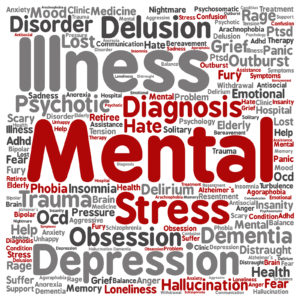There was a time — most of my adult life, actually — when I was embarrassed about having a mental illness. I got to be creative when I discussed it — or rather, when I tried to avoid discussing it. I’d tell concerned co-workers who wanted to know why I was out sick that I was just “feeling under the weather.” In one of my early columns, I wrote about how I was tired of living lies and was moving on. Basically, my thoughts were these: “I’ve got bipolar disorder, and I’ve gotten over it. And so should you.”
Last week I learned the stories of two women living with disabilities. One of the stories, on NPR, was about a medical student living with a mental illness, and the other was a Facebook post that went viral by a 19-year-old with Crohn’s disease.
Both women’s stories were moving. While they shared the same goal — to combat stigma and tell readers and listeners that it’s OK to have a disability, that you don’t have to be ashamed — they went about it in different ways.
Aimee Rouski, who was diagnosed with Crohn’s disease at 15, told about undergoing three major surgeries over the years. It sounded awful. She shared photos of her scars and ileostomy bag and revealed that she had no large intestine, colon, rectum, anus or inner thigh muscles.
She got more than 26,000 likes.
The story on NPR was about a family practice medical student named Giselle who had been suicidal at one point, prior to her matriculation, and struggled with the grueling demands of medical school. The excessive hours spent working and studying at the expense of sleep can be a Molotov cocktail for people with mental health issues, whose minds often work better with a more structured life and regular sleep patterns.
It was an interesting story because she really struggled academically, and I’m sure there are others out there with disabilities of all kinds who would love to go to medical school were it not so brutal. She ended up taking fewer courses at a time.
NPR said it was using only her first name in the story out of concern for her career. I was confused and somewhat disappointed. I understand leaving off someone’s last name if she is at risk of being harmed. I’m not sure what the concern was about her career. Losing patients who might find out she has a mental illness?
Potential patients do Google doctors and even read Yelp reviews. But I think she’d have a successful career ahead of her if she became known as a great doctor who lives with a mental illness. A lot of people these days are desperate for doctors who understand suffering, grief and the human condition. Family medicine doctors treat a lot of depression issues. Is the issue what she’s embarrassed about?
It took me a long time to “out myself,” and I worried for years unnecessarily about a lot of the possibilities, including how it would shape my future. Employers Google potential employees as well. And while obviously not everyone wants to write a column about what’s going on in their head, my advice to young students like Giselle is that ultimately, nobody really cares. They’re going to care more about her skills as a doctor.
I wish I hadn’t waited so long to take the plunge because living with secrets is stressful.
I went to a talk once about autism presented by Temple Grandin, a well-known professor of animal science at Colorado State University who has autism. She has written several books about it and educates people worldwide with talks during book tours. She offered a lot of tips that day, and dozens of listeners lined up to ask their own questions. She seemed to love being in the limelight and speaking in public.
Everyone with a disability has to make a choice about what they want to share with the world and what they feel comfortable with. Both Aimee and Giselle spoke out when they didn’t have to. Kudos to them. Their stories were compelling.
Ultimately, I think it’s hard to hide a serious illness and feel at peace. But I’d like to think that the world is changing, and the more people who use their last name in media stories about mental illness, the less of a big deal it’s going to be.

